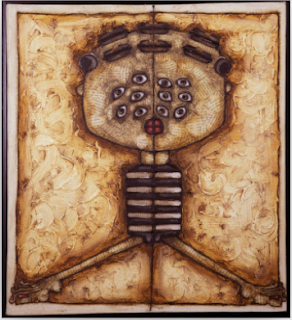Women in Latin America
 |
| me veo y no me siento, 1998 Raquel Paiewonsky |
I went on JSTOR and looked for an article that relates to the artwork. The article that I found was "Women's Political Participation in the Dominican Republic: The Case of the Mirabal Sisters" by Nancy Robinson from Caribbean Quarterly. The main idea of the article is to highlight women's active role in politics in Latin American countries despite the common and traditional misconception of women's passive role in Latin cultures and societies. The article is about the Mirabal sisters who resisted and opposed the dictatorship of Rafael Trujillo in the Dominican Republic (1930-1961). The sisters were ultimately assassinated by Trujillo's men. United Nations officialized the day in 1999 as "International Day for the Elimination of Violence against Women" to commemorate women's rights to a life free of violence. The text states, "the enduring significance of the Mirabal sisters in the Dominican Republic is that
they have legitimized women's political participation not as 'mothers of the disappeared' or widows, but as political activists in their own right" (Robinson 180). The Mirabal Sisters from left,
Minerva, Maria Teresa and Patria
Paiewonsky's work is captivating in its own strange way. The image of the distorted women is the artist's way of expressing women's hardships in finding their own identities, especially in misogynistic environments teeming with stereotypes and discrimination towards women. In the JSTOR article, three sisters from the Dominican Republic defied the societal norms and fought for their people's freedom from a tyrant, and unfortunately, they fought until they couldn't anymore. The JSTOR article relates to my theme for my Latin American Humanities class, which is the relationship between people and authority. In the case of the Mirabal sisters, they rebelled against authority in hopes to topple Trujillo's authoritarian regime.
Works Cited
"Badass Women in History: The Mirabal Sisters 'The Butterflies.'" Youtube, uploaded by Lajuar Creatura, 6 Nov 2018, https://www.youtube.com/watch?v=hhdxHnau2FA.
ROBINSON, NANCY. “Women’s Political Participation in the Dominican Republic: The Case of the Mirabal Sisters.” Caribbean Quarterly, vol. 52, no. 2/3, University of the West Indies, 2006, pp. 172–83, http://www.jstor.org/stable/40654568.



Comments
Post a Comment